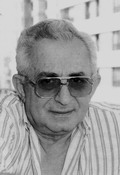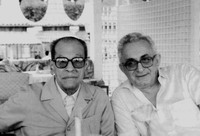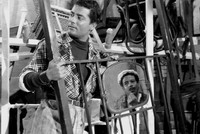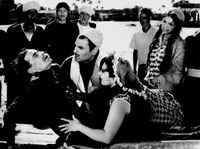Tewfik Saleh
(b. 1926)

Tewfik Saleh
(b. 1926)

Tewfik Saleh and Naguib Mahfouz

Shukri Sarhan in Fools' Alley

Ezzat el Alayli and Soheir el Murchedi
in EL Sayed el Bolti
Tewfik Saleh was born on 27 October 1926 in Alexandria. He lived in Wingate St. in Bulkeley, a district that was heavily populated with foreigners of different nationalities.
Despite his father’s discouragement, his love for cinema started since childhood. He would sneak out to the cinema every Sunday to watch a new movie. Moreover, his fluent English and French enabled him to establish relationships with the foreigners who lived in Alexandria and who were also interested in the cinema. But it seems that he had a clear target very early on because he was particularly infatuated by the role of the director. That is why he read a lot about directing, its different schools and the most important directors.
After graduating from Victoria College in Alexandria, he earned a BA in English Literature from Alexandria University in 1949. He eventually moved to Cairo to study directing but there was no academic institute that taught cinema. That is why he helped in founding the Cinema Institute later.
He went to France in 1950 on a scholarship to study the art of cinema. He also worked as an assistant director in three French films. More importantly, his sensibility was enriched in France because he did not limit himself to studying cinema but also took up painting and photography, and frequently visited André Lhote’s studio. It was also in France that he had his first encounter with Russian literature, especially Dostoyevsky’s oeuvre.
He came back to Cairo in 1953, but with a different outlook and an enriched sensibility. Another important factor that shaped his consciousness was his new friendship with Naguib Mahfouz. Through this friendship, he came to know more about Old Cairo, its details and the people that inhabit it.
He wrote in collaboration with Naguib Mahfouz his film debut Fools' Alley (Darb el mahâbîl) and directed it in 1955. The film basically exposes the greed, materialism and opportunism of an alley's inhabitants who chase a mentally retarded homeless person after he won the lottery.
It took Saleh another seven years to direct The Struggle of Heroes (Sirâ’el abtâl) in 1962 set during the cholera epidemic of the 1930s. The epidemic was not only a disease that ravaged the village but it also evoked the peasants' ignorance, and the self-serving interests of the aristocratic landowners.
The Rebels (el Moutamarridoun) in 1966 was set in a sanatorium where the discrepancy between the conditions of the first–class privileged patients and the third-class ones was glaring. The unprivileged patients rebel and take charge of the sanatorium. At the beginning, they create just conditions, but the rot soon sets in and their utopia falls apart.
He wrote and directed El Sayed el Bolti (el Sayyed el Boltî)in 1967 based on Saleh Morsi's novel The Alley of Sayed el Bolti. The film, which deals with the struggle of poor fishermen against a monopolist, was shot in El Ma'adiya in Alexandria.
Saleh often had a hard time with the censorship. His films produced by the film organization El Sayed el Bolti (el Sayyed el Boltî)and The Rebels both had to wait two years until their release. In the case of the The Rebels (el Moutamarridoun), the censor understood Saleh's The Rebels (el Moutamarridoun) as an allegory of Nasser's regime and consequently the film was banned for two years. As for El Sayed el Bolti (el Sayyed el Boltî), the censor used a scene of two young women waxing their legs to postpone the release of the film (Shafik, p. 137).
His next film, Diary of a Country Prosecutor (Yawmiyyât nâ’ib fi-l-aryâf), based on Tewfik el Hakim's novel, is counted among the best adaptations.
Saleh, who often came up against censorship and bureaucracy, was turned down by the private sector and had great difficulties realizing his plans in the public sector, and decided to leave for Syria in 1969 to seek foreign production. . It was there that he directed The Dupes (el makdu’un), an adaptation of Ghassan Kanafani’s acclaimed novella, Men in the Sun. The Dupes (el makdu’un) is one of the first Arab films to address the Palestinian predicament. It presents the pathetic story of three Palestinian refugees who want to make their way across the border into Kuwait in search of employment. But because it is quite difficult to obtain an entry visa, they strike an agreement with a truck driver to smuggle them illegally by hiding them in the steel tank of his truck. Their attempt is doomed to fail for they die inside the tank in the scorching heat at the Iraqi-Kuwaiti border. The film received critical acclaim and collected many awards, among which are the Golden Tanit at Carthage Film Festival in 1972, the First Prize from Strasbourg Festival in 1973, the First Prize from the International Catholic Centre in Belgium in 1973 and Lenin's Peace Award from Moscow Festival in 1973.
In 1973, he moved to Iraq in order to teach cinema at Iraq's Radio and TV Institute and its Art Academy. During his stay, he managed to secure funding for his feature film, Long Days (el ayyam el tawîlâ), from the Iraqi Theatre and Film Organization. He returned to Egypt in the mid 1980s to teach at the Higher Film Institute.
Despite the fact that Saleh is not a prolific director, his films have left their mark on Egyptian and Syrian cinema. His films Fools’ Alley (Darb el mahâbîl) and The Diary of a Country Prosecutor (Yawmiyyât nâ’ib fi-l-aryâf) are counted among the classics of Egyptian cinema and The Dupes among the classics of Egyptian and Syrian cinema.
His love for literature is clear, for most of his films are adaptations of literary works. The Dupes (el makdu’un), based on Ghassan Kanafani’s novel Men in the Sun, and The Diary of a Country Prosecutor (Yawmiyyât nâ’ib fi-l-aryâf), based on Tewfik el Hakim’s novel, are obvious examples. He also had a strong friendship with the poet Salah Jahin and the novelists Youssef Idris and Naguib Mahfouz. In fact, most of his friends were from the literary rather than the cinema circles.
Saleh the scriptwriter and director, who always worked behind the camera, was to appear once before the camera in Youssef Chahine's film Alexandria Again and Forever (Iskandariyyah Kamân we Kamân).
The output of this eminent committed Egyptian set him apart from the commercial cinema of his country. His intellectual vision coloured his oeuvre for all of his films deal with social injustice, underdevelopment, political abuse, ignorance and the class struggle. That is why he was deservedly awarded a first-class Sciences and Arts Decoration from President Abdel Nasser in 1967, the Tunisian Medal for Cultural Distinction in 1988 and the State Appreciation Prize in 1996.
Filmography:
Feature Films:
1955: Fools' Alley (Darb el mahâbîl)
1962: Struggle of Heroes (Sirâ’el abtâl)
1968: The Rebels (el Moutamarridoun)
| 1968: The Rebels (el Moutamarridoun) |
1968: Diary of a Country Prosecutor (Yawmiyyât nâ’ib fi-l-aryâf)
1969: El Sayed el Bolti (el Sayyed el Boltî)
1972: The Dupes (el makdu’un)
*Syrian Production
1980: Long Days (el ayyam el tawîlâ)
*Iraqi Production
Documentaries and Short Films:
1956: Corniche el Nil
1957: Puppet Show
1959: Our Industrial Renaissance
1960: Who are we? (An English-speaking documentary on the Palestinian refugees)
1960: Towards the Unknown
1961: The Minority
1977: The Dawn of Civilisation (Iraqi Production)
Actor-Filmography:
1989: Alexandria Again & Forever (Iskandariyyah Kamân we Kamân)
| 1989: Alexandria Again & Forever (Iskandariyyah Kamân we Kamân) |
References:
- Shafik, Viola. Arab Cinema: History and Cultural Identity. Cairo: AUC Press, 1998.
- Wefi, Mohsen. Cinema Tewfik Saleh. Cairo: Cultural Development Fund.
- Shawki, Souad. Cinema Yusuf Shahin. Cairo: Afâq el Cinema, 2004.
- Shemayt, Walid. Yusuf Shahin hayah lel Cinema. Beirut, Riyad el Rayyes lel Kotb wa el Nasher, 2001.
- In 1973, he moved to Iraq in order to teach cinema at Iraq’s Radio and TV Institute and its Art Academy.

